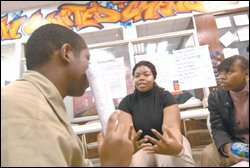Unhappy with Philadelphia’s standardized-testing procedures, students from one of the city’s high schools have persuaded the district to improve test preparation and test administration for high school students districtwide.
Students at Strawberry Mansion High School who belong to Youth United For Change, a Philadelphia-based youth-organizing group, are to announce this week the changes that will take effect at all 22 of the district’s comprehensive high schools. Their work was sparked by complaints from peers in 2004 that they had to leave core subjects to attend preparation sessions for state- and district-mandated tests.

“We had to get on this issue, and we had to get on it now,” Anthony Williams, a 17-year-old senior at the school of 800 students in North Philadelphia, said last week. “If you have to get pulled out of your major-subject classes, why do you come to school then? It just takes away your learning time.”
In their research, the student activists learned that their peers were chosen for such preparation if they scored at the upper end of certain testing brackets, because improving those scores was more likely to help the school move more students into the next-highest bracket and avoid sanctions under the federal No Child Left Behind Act.
Chief Academic Officer Gregory E. Thornton said the selection of test-prep participants was one of many ways the district tried to “move more kids across thresholds.” But he said such preparation will be embedded in coursework instead.
The students met with experts to understand what constitutes good test preparation, and analyzed Strawberry Mansion’s test scores over time. They surveyed 200 fellow students about issues they saw with testing practice.
The survey showed that eight out of 10 students disagreed with being taken out of major-subject classes for test preparation. Most felt the school’s staff put too much emphasis on test scores.
Though its state test scores have been improving, Strawberry Mansion is in the second year of “corrective action” under the No Child Left Behind law, in which it faces such possible sanctions as restructuring.
Positive Response
In a series of meetings with top academic officers in the 205,000-student school district, the students from Strawberry Mansion High shared their findings and proposed changes. The district agreed to revise its policy both on test preparation and test administration.
“We’ve seen this as an opportunity to hear students’ voices on the issue of assessment,” said Mr. Thornton. “I’m nothing but complimentary of the work they’ve done.”
In addition to test preparation being part of regular classwork, elective classes or after-school sessions on test-taking tips might also be offered.
The district has also agreed to try to make test-preparation more engaging. In the survey, students said they wanted sessions to include more games and interesting stories, and better relate to their lives. The teenagers also said they’d be more likely to attend sessions and exams if there were incentives such as pizza parties, and the district has agreed to consider that.
The district has pledged to make test preparation available to all students who want it. The student activists had been concerned not only about missing important lessons, but also that the help was inequitably distributed.
Tiffany Thomas, 17, recalled how she felt when she was pulled out of her social studies class at Strawberry Mansion last year.
“You would think I would be happy to get the help, but I enjoyed social studies. And it made me feel bad for the other students who needed help and weren’t chosen,” said the senior.
District leaders also took to heart the students’ suggestions on changes for administering the tests. They promised to explore the possibility of using mathematics classrooms for English tests, and English classrooms for math tests, to avoid having helpful hints around during tests.
A list of guidelines outlining what is and isn’t acceptable during test-taking—such as not asking teachers for help completing answers—will be posted, and two proctors will be assigned to each room during tests to certify that proper procedures were followed.
The testing changes were the latest brought about by Youth United for Change, which seeks to build leadership in young people through activism. In the last few years, students have won stronger course offerings and better lighting for a dangerous route to Kensington High School, and more money for technology at Olney High School.






